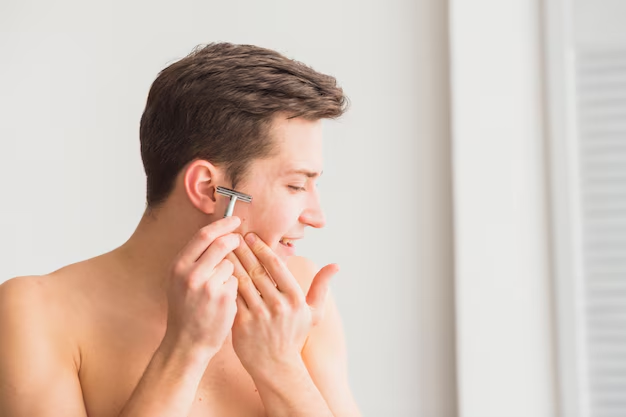Is Testosterone the Culprit Behind Your Acne Breakout?
Acne — the nemesis of smooth skin that can strike when least expected, often making us ponder: why now? If you've ever wondered whether hormones, particularly testosterone, are complicit in the sudden appearance of pimples, you're not alone. Let's delve into this query and explore what science says about the link between testosterone and acne, and how you might manage the situation if it arises.
Understanding Acne: What Really Causes It?
Before exploring the role of testosterone, it's crucial to understand what causes acne. At its core, acne develops when hair follicles become clogged with oil and dead skin cells. This can result in whiteheads, blackheads, or pimples.
The Usual Suspects:
- Excess Oil Production: Overactive sebaceous glands produce more oil than necessary, which can trap dirt and bacteria.
- Hair Follicles Clogged by Dead Skin Cells: Without proper exfoliation, dead skin accumulates, blocking oil release.
- Bacteria: Specifically, Cutibacterium acnes (formerly Propionibacterium acnes), which can inflame follicles.
- Inflammation: The body’s response to an infection or irritant often exacerbates acne.
How Does Testosterone Come into Play?
Testosterone, often associated with male puberty, is a hormone present in both males and females, though in differing levels. It plays an integral role in bodily changes, including those seen on the skin.
Testosterone and Its Effects on Skin
During puberty, or due to hormonal imbalances, testosterone levels can spike, leading to several skin changes:
- Increased Oil Production: Testosterone encourages the sebaceous glands to produce more oil. This is a natural part of development, but it can lead to clogged pores.
- Thickening of the Skin: This process can result in changes to the skin's texture and appearance.
- Increased Skin Cell Production: The quicker turnover can contribute to clogged pores if not managed with proper skincare.
Key point: While testosterone is linked to increased oil and subsequent acne, not everyone with high testosterone levels will experience acne.
Why Acne Isn’t Just a Teenage Problem
While adolescence might be the time most associated with acne, adults are not immune. Hormonal changes, including fluctuations in testosterone, can occur due to various factors:
- Menstrual Cycles: Women often experience hormonal acne linked to their cycle.
- Pregnancy or Birth Control: These can cause hormonal changes, occasionally resulting in acne.
- Polycystic Ovary Syndrome (PCOS): A condition characterized by elevated male hormones (including testosterone) in women, often results in acne.
- Healthy Lifestyle Factors: Exercising and managing stress help maintain balanced hormone levels.
The Intersection of Diet, Stress, and Hormones
Diet and stress can have indirect effects on testosterone levels, affecting acne.
Diet and Hormonal Acne
While research is ongoing, some studies suggest certain diets might modulate testosterone levels:
- High-Sugar Foods: These can cause inflammation and spikes in insulin, possibly affecting hormone levels.
- Dairy Products: Sometimes linked with acne, potentially due to hormonal content.
- Balanced Diet: Emphasizing fruits, vegetables, and lean proteins can help manage hormone balance.
Stress and Acne
Stress triggers the adrenal glands to produce more androgens, a group of hormones that includes testosterone. This can lead to increased oil production and, inevitably, acne.
Tip: Mindfulness, meditation, or regular physical activity can serve as powerful stress-relief tools.
Managing Acne When Testosterone is Involved
If you suspect your acne is hormone-related, focusing on skincare and lifestyle changes may help.
Skincare Routine
- Gentle Cleansing: Avoid over-cleansing, which can irritate the skin further. Use a gentle, non-comedogenic cleanser.
- Exfoliation: Once or twice weekly to remove dead skin cells.
- Moisturize: Keeping the skin hydrated prevents overproduction of sebum.
- Spot Treatment: Products containing benzoyl peroxide or salicylic acid can help.
Lifestyle Adjustments
- Regular Exercise: Keeps hormones balanced and promotes healthy skin.
- Sleep Hygiene: Aim for 7-9 hours of quality sleep to support hormonal balance.
- Diet Considerations: As suggested earlier, a balanced diet positively influences hormone regulation.
Myths and Misconceptions About Testosterone and Acne
Let's clear the air on common misunderstandings:
- “Only Teenagers Get Hormonal Acne”: Adults can experience hormonal changes that trigger acne.
- “Testosterone Supplements Will Always Cause Acne”: Not universally true; individual reactions vary based on many factors, including genetic predispositions and lifestyle.
- “More Testosterone Equals More Acne”: Acne incidence and severity vary widely among individuals, even with similar testosterone levels.
Final Thoughts and Practical Tips
Understanding the link between testosterone and acne can help you tackle the issue head-on. Awareness and proactive management strategies go a long way in maintaining clear skin. Remember, everyone's skin is different—what works for one person might not be as effective for another.
Key Takeaways
- Testosterone Influences Acne: But it's not the sole factor. Comprehensive skincare and a healthy lifestyle play pivotal roles.
- Monitor Hormonal Changes: Consider events such as menstrual cycles or lifestyle changes that might impact hormone levels.
- Consistent Skincare: Maintain a routine that's gentle yet effective in managing oil production and exfoliation.
Summary 🗂️
- Why Acne Happens 🌿: Excess oil, bacteria, clogged pores, and inflammation.
- Testosterone’s Role 🔬: Can increase oil production and skin cell turnover.
- Beyond Teens👩🦳: Adults can experience testosterone-related acne due to lifestyle, diet, and stress.
- Manage via Skincare 🧴: Use non-comedogenic products, hydrate, and spot-treat.
- Lifestyle Tips 🚴♀️: Exercise, eat a balanced diet, and manage stress levels.
By understanding these connections and employing strategic skincare and lifestyle choices, you can better navigate the challenges acne presents, with or without testosterone fluctuations.

